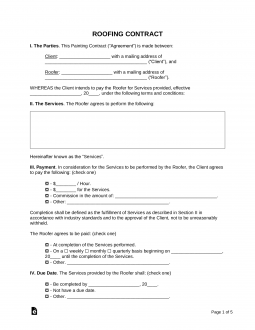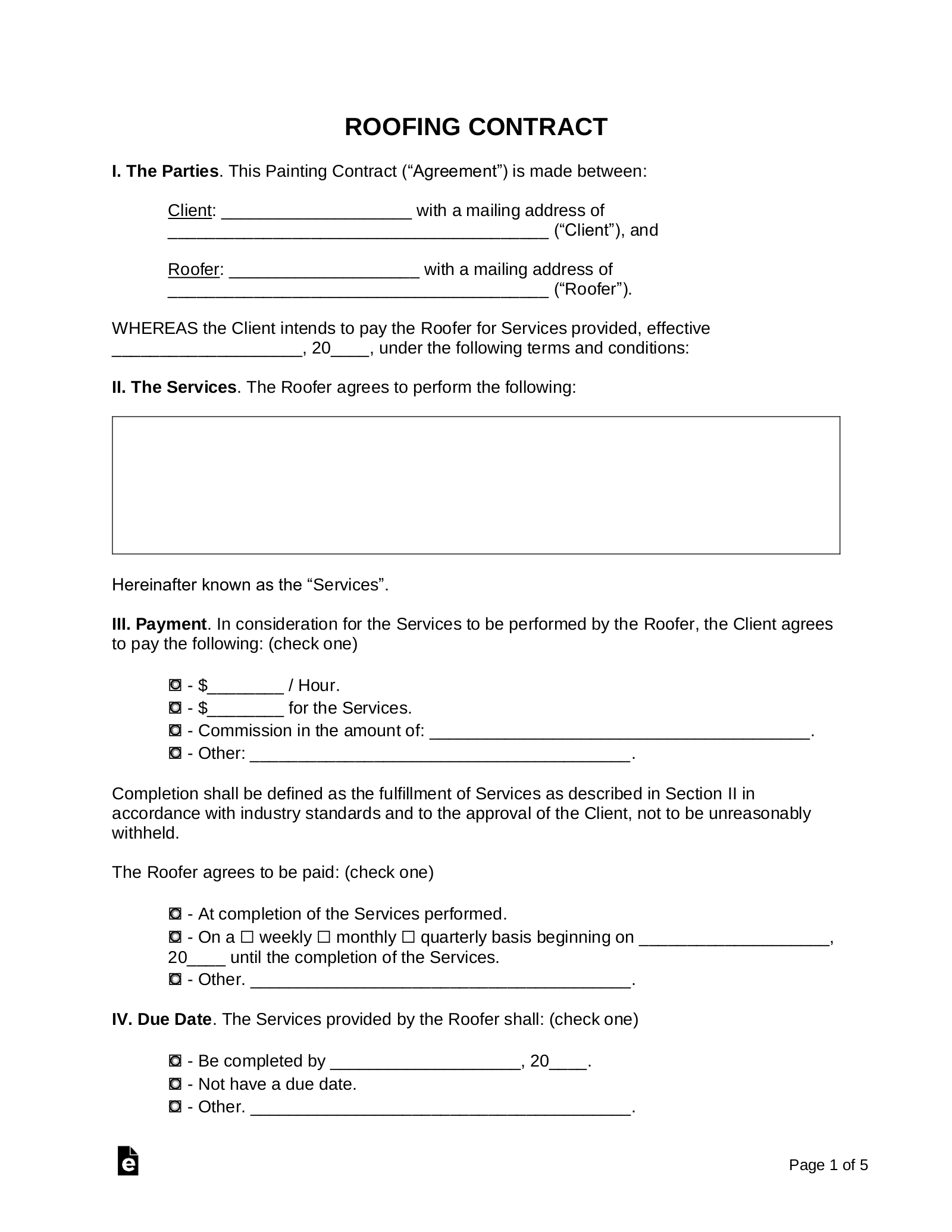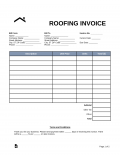Updated November 28, 2023
A roofing contract is a legally binding agreement between a client and a roofer that outlines the deliverables, scope of work, and timelines. The roofer will be obligated to perform their duties, and the client will be required to pay in accordance with the contract.
It is advised that a client make installment payments to the roofer based on performance (e.g. 50% payment at the start and completion of the project).
Can be used for:
- New roof
- Roof repair or modification
- Residential or commercial property
Table of Contents |
3 Keys to Being a Successful Roofer
In addition to installing and maintaining roofs with superior craftsmanship, a successful roofer will often have the following qualities:
1. Good Reviews

Lookup reviews online on the following websites:
- Angi.com – Formerly Angie’s List, allows a person to find roofers, read reviews, and request a quote.
- Yelp.com – Find reviews from past customers who claimed to have used the roofer in the past. Although, the reviews are not verified.
- Google Maps – Use to find roofers in your area and read reviews, although they are not verified.
- Word of Mouth – The best way to find a good roofing company is to ask someone that has used them in the past. Especially if it has been a few years since the installation. Then the past customer will know if there have been any leaks since the installment.
2. Certifications
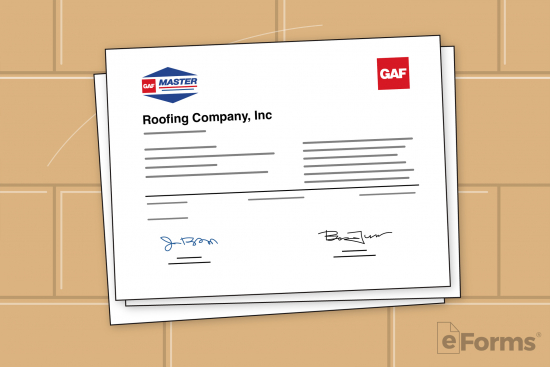
Other than being licensed, a roofer may also have the following certifications from the manufacturers that produce the roofing materials:
- GAF Materials Corporation – The largest roofing manufacturer in the USA and the most common certification in the industry.
- CertainTeed – A national roofing manufacturer that offers 2 types of certifications for roofers; ShingleMaster™ and SELECT ShingleMaster™.
- Owens Corning – Known for being an especially high-quality roofing manufacturer, their certifications are for contractors that deal exclusively with their product.
- TAMKO – Perhaps the smallest of the national manufacturers, TAMKO offers exclusive training for “Pro” certified roofers.
- National Roofing Contractors Association (NRCA) – A roofer may obtain a ProCertification® that exemplifies “substantial roofing skills.”
3. Insurance
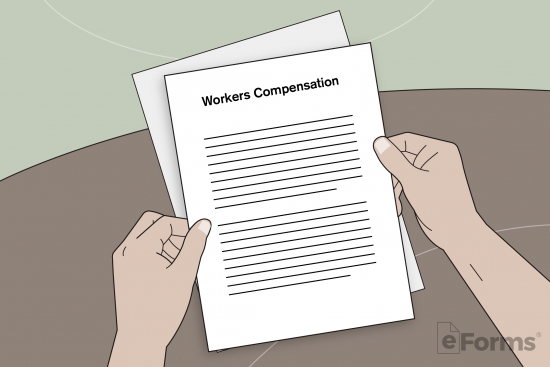
Make sure that a roofer shows proof of 2 types of insurance:
- Liability (General) Insurance – Protects the roofer from accidents related to the installation. Due to roofers being a high-risk job, they will obtain insurance through excess and surplus (E&S) lines which cover specialty professions with higher risk (that standard insurance companies don’t offer).
- Workers’ Compensation Insurance – Protects the employees in the event of injury
Warranty
Roofs are commonly guaranteed for a period of 25 to 30 years. This includes both residential and commercial property. This does not cover if there is damage due to outside forces (such as a tree falling on the roof).
What if the roof starts leaking after the installation?
The warranty will cover all standard maintenance on the roof, including leaks and any other issues caused by installation defects. If a roof needs repairing due to inclement weather, typically, homeowners insurance will cover the repair.
What happens to my warranty if a roofer goes out of business?
When a warranty is given to a property owner, it is commonly an insurance policy against defects purchased by the roofer and assigned to the property owner. Due to most roofing companies being small businesses, chances are in they may not still be around at the end of the warranty.
How Much Does a Roofer Make?
The earnings of a roofer will depend on the roofer’s experience, location within the country, and type of jobs performed. The installation of solar panels on the roof may also make a difference.
Median Pay
State License Requirements
A roofer needs to be licensed in 24 states. The requirements for obtaining a license from the state are as follows:
| State | License Required? | Statute |
| Alabama | Yes, for residential contractors of bids $10,000 or more and commercial contractors of $50,000 or more. | Chapter 230-X-1 |
| Alaska | Yes, commercial roofing requires proof of liability insurance and a $5,000 bond. Residential roofing requires classes provided by the Alaska Craftsman Home Program (ACHP). | 12 AAC 21.020 |
| Arizona | Yes, roofing is designated as a “specialty contractor” and requires licensure with the Arizona Registrar of Contractors. | ARS 32-1121 & ARS 32-1122 |
| Arkansas | Yes, a roofer needs to be licensed through the Arkansas Contractors License Board which requires a surety bond of $15,000 and workers’ compensation coverage. | § 17-25-604 |
| California | Yes, a roofer needs to be licensed by the Department of Consumer Affairs Contractors State License Board for projects valued at more than $500. | Title 16, Division 8, Article 3 |
| Colorado | No, but roofers are required to have a business license. | N/A |
| Connecticut | No, but roofers must be registered with the Department of Consumer Protection. | N/A |
| Delaware | Yes, a roofer needs to be licensed with the Delaware Division of Revenue for jobs worth more than $50,000. | § 2502 |
| Florida | Yes, either as a statewide roofer or a roofer registered in a specific city or county. Click here for more information. | § 489.115 |
| Georgia | No. | N/A |
| Hawaii | Yes, a roofer in Hawaii needs a C-42 Roofing Contractor License from the Department of Commerce and Consumer Affairs Professional and Vocational Licensing. | § 436B-10 |
| Idaho | No, but roofers must be registered with the Idaho Contractors Board. | § 54-5205 |
| Illinois | Yes, a roofer in Illinois must have a license issued by the Department of Professional Regulation. | 225 ILCS 335 |
| Indiana | No. | N/A |
| Iowa | No, but roofers who earn more than $2,000 per year must be registered with the Iowa Division of Labor. | Chapter 91C |
| Kansas | No, but roofers must be registered with the Kansas Attorney General. | § 50-6,121 |
| Kentucky | No. | N/A |
| Louisiana | Yes, a roofer must have a license to work on a project worth more than $75,000 in home improvement value or repair work worth more than $7,500. | § 503 |
| Maine | No, unless the roofer is working with asbestos. | |
| Maryland | No, unless the work is considered to be home improvement, in which case it must be licensed by the Maryland Home Improvement Commission. | § 8-601 |
| Massachusetts | Yes, a roofer in Massachusetts must be licensed by the State Board of Building Regulations and Standards. |
|
| Michigan | Yes, a roofer in Michigan must have a license from the Department of Licensing and Regulatory Affairs. | § 339.2403 |
| Minnesota | Yes, a roofer must have a license from the Department of Labor and Industry if earning more than $15,000 annually. | |
| Mississippi | Yes, a roofer who does a job worth more than $10,000 needs a license from the Mississippi State Board of Contractors. | § 73-59-3 |
| Missouri | No, a roofer does not need a license in Missouri, but it’s a good idea to check local laws. | N/A |
| Montana | No, a roofer does not need a license in Montana, but a roofer with employees must register with the Department of Labor and Industry. | N/A |
| Nebraska | No, but roofers must be registered with the Nebraska Department of Labor. | § 48-2104 |
| Nevada | Yes, a roofer in Nevada needs a C-15a Roofing Contractor License from the State Contractors Board. | NAC 624.320 |
| New Hampshire | No, unless the roofer is working with asbestos. | § 1806.03 |
| New Jersey | No, but roofers are required to be registered with the state. | § 56:8-138 |
| New Mexico | Yes, a roofer in New Mexico needs a license from the Construction Industries Division. | Article 13 |
| New York | No, but check local laws. | N/A |
| North Carolina | Yes, a roofer doing a job worth more than $30,000 needs a license from the North Carolina Licensing Board for General Contractors. | § 87-10 |
| North Dakota | Yes, a roofing license from the Secretary of State of North Dakota is required for jobs valued at $4,000 or more. | § 43-07-02 |
| Ohio | No, but check local laws. | Chapter 4740 |
| Oklahoma | No, but a roofer must be registered with the state. | Title 59 |
| Oregon | Yes, roofers in Oregon need a license from the Construction Contractors Board. | Chapter 701 |
| Pennsylvania | No, but check local laws. | N/A |
| Rhode Island | Yes, roofers in Rhode Island need a license from the State of Rhode Island Contractors’ Registration and Licensing Board. | § 5-73-3 |
| South Carolina | No, but roofers must be registered with the South Carolina Department of Labor, Licensing and Regulation. | N/A |
| South Dakota | No, but check local laws. | N/A |
| Tennessee | Yes, roofers in Tennessee need a license from the State of Tennessee Department of Commerce and Insurance Board for Licensing Contractors to work on projects worth more than $25,000. | § 62-6-103 |
| Texas | No. | N/A |
| Utah | Yes, roofers in Utah need a license from the Utah Department of Commerce Division of Occupational and Professional Licensing. | § 58-55-301 |
| Vermont | No, but check local laws. | N/A |
| Virginia | Yes, roofers working in Virginia need a license from the Department of Professional and Occupational Regulation Board of Contractors. | § 54.1-1103 |
| Washington | No, but roofers do need to be registered with the Department of Labor and Industries Contractors Registration Section. | RCW 18.27.020 |
| Washington D.C. | ||
| West Virginia | Yes, roofers must be licensed by the Division of Labor West Virginia Contractor Licensing Board. | Chapter 30, Article 42 |
| Wisconsin | No, but roofers working with asbestos must be certified by the Asbestos Unit Bureau of Public Health. | Chapter DHS 159 |
| Wyoming | No, but check local laws. | N/A |
Sample
Download: PDF, MS Word, OpenDocument
ROOFING CONTRACT
I. PARTIES. This Roofing Contract (“Contract”) entered into on [DATE] is between:
Roofer: [ROOFER’S NAME] with a mailing address of [ADDRESS] (“Roofer”) acting as an independent contractor, and
Client: [CLIENT’S NAME] with a mailing address of [ADDRESS] (“Client”).
II. TERMS. The Roofer hereby agrees to perform the following services in exchange for payment from the Client as follows:
III. Services Performed. The Roofer agrees to provide the following roofing services: [SERVICES]
IV. Roofing Location. [ADDRESS]
V. Payment. $[AMOUNT] shall be for the entirety of the services performed.
Installments. Payment shall be made by the Client to the Roofer in 2 installments:
1. $[AMOUNT] upon acceptance of this Contract; and
2. $[AMOUNT] once complete (including clean-up).
VI. Industry Standards. The Roofer agrees to perform their work in the same craftsmanship with current industry standards and under the terms of this Contract.
VII Cleanup. The Roofer agrees to clean up any materials, waste, or excess debris left at the location and leave the property in a similar manner as it was prior to the start of the services.
VIII. Changes to Contract. Any changes made to this Contract must be requested and agreed to, in writing, by both the Client and the Roofer.
The parties hereby signify their agreement to the terms above by their signatures affixed below:
Roofer’s Signature: ____________________________ Date: _______________
Print Name: ____________________________
Client’s Signature: ____________________________ Date: _______________
Print Name: ____________________________
Related Forms
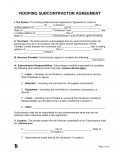 Roofing Subcontractor Agreement
Roofing Subcontractor Agreement
Download: PDF, MS Word, OpenDocument
Download: PDF, MS Word, OpenDocument

